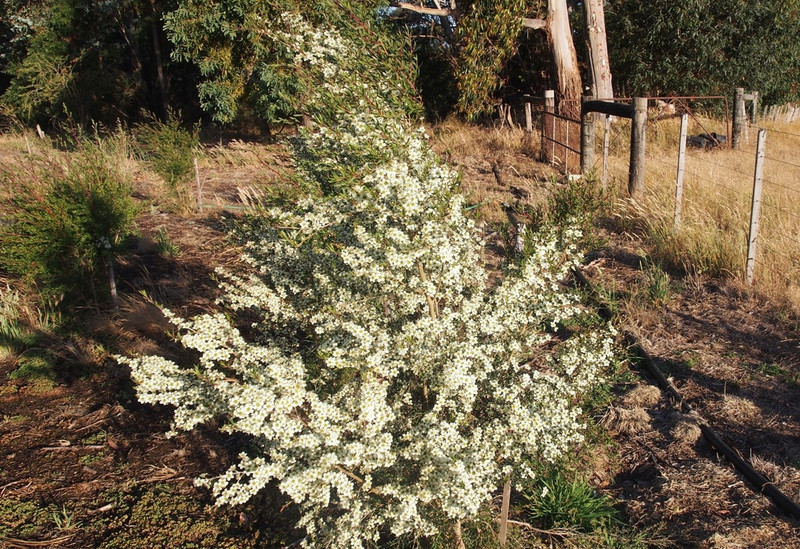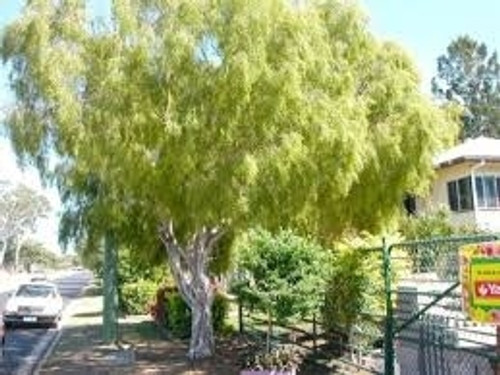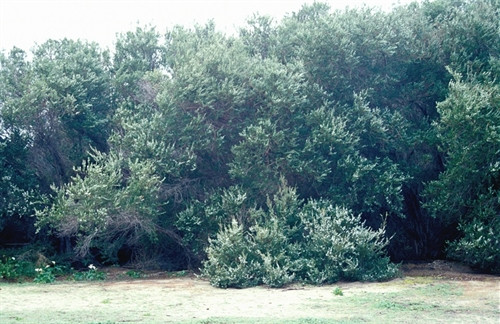Please visit https://www.leptospermum.com.au/ to answer the most commonly asked questions.
This species has leapt into prominence in recent times due to the medicinal and other properties of the honey produced from the flowers. The honey is very similar in terms of its chemical structure and medicinal properties compared to manuka honey produced from the flowers of Leptospermum scoparium (manuka). Leptospermum polygalifolium subspecies polygalifolium occurs naturally from around Sydney to the NSW Victorian border. Previously (or also) known as Leptospermum flavecens (tantoon).
Another 4 Leptospermum polygalifolium sub species occur from southern coastal NSW to Far North Queensland.
Our Leptospermum. polygalifolium subsp cismontanum has been selected from populations and the north coast region of NSW (Broadwater Area) and SEQ (Sunshine Coast hinterland) and have been tested for bioactivity.
ERA Will also be supplying an arid zone inland form (L. polygalifolium subsp transmontanum) in early 2017 once the populutions have been tested and their DHA status is verified following nectar sampling and analyis in Spring 2016.
We have also identified a cold tolerant form of L. polygalifolium subsp polygalifolium from far southern NSW at altitude where winter temperatures can get below -10C. These selections will be trialed and in southern Victoria over the next 18 months or so.
Leptospermum scoparium on the other hand occurs naturally in Tasmania where it is widespread, in southern Victoria as far west as the Grampians and into the far south coastal belt of NSW. - and of course New Zealand.
Jelly bush is an attractive plant often used as an ornamental. It grows to around 2 - 4m and would be the species of choice for plantations for the production of honey north of the NSW - Vic border whilst Manuka would be better suited to the southern states.
Both species prefer higher rainfall, good drainage and neutral to slightly acid soils.
Bio-active Leptospermum species are ideal for growing in a plantation development. In fact, the future of Australian bio-acive honey production lies to a very large extent on the development and management of such planations whether they be farm based or larger industrial scale projects.
We can advise on development of such projects and can supply large scale tested and verified planting stock over a range of Leptospermum species in Queensland, NSW, Victoria and South Australia.
ERA is engaged in various Leptopspermum collaborative research projects to quantify the various desirable traits of a number of different species and also to collect material from superior individuals within superior communities for the devopment of seed orchards. Seedlings from these projects (at their various stages) will become available from early 2016 and continual improvement is anticipated thereafter.
We have had unpredendented enquiry levels regarding Leptospermum scoparium and this species, Leptospermum polygalifolium (jelly bush) since the ABC Landline - Manuka Honey story went to air on 8th of March 2015 and followed up with another Landline story on 7th February 2016. These enquiries have come from all over Australia and from apiarists, farmers and small landowners wishing to learn more about the potential for developing commercial scale bio-active Leptospermum plantations. If your considering undertaking such a project, and need advice, please contact ERA's Ted Allender on 0428 146 203 during EAT business hours.
Seedlings that are forward ordered for larger projects will receive very generous volume discounts.
More Information go to;
www.leptospermum.com.au
Pricing Schedule for bioactive Leptospermum tubestock (Hikos)
(Not available in WA, Tasmania or NT),
Up to 500. Purchase on-line.
500 - 10,000 seedlings ex nursery. Freight by arrangement.
- Level 1. Basic genetics where the general wild population has been tested at a reconnaissance level. $0.95c each.
- Level 2. individual plants tested in the wild and seedlings grown from seed harvested from the best 10% (i.e. highest DHA levels, form, health and vigour). $1.10c each.
- Level 3. Where the seedlings have been grown from seed and established in a professionally designed, replicated seed orchard stocked with clones grown from collections as per level 2 above. $1.50 - $2.00 each depending on species and predicted genetic gain. The 1st of 3 seed orchards will produce seed in 2018 with seedlings available in 2019. The remaining 2 seed orchards 1 year later.
(1) Orders over 10,000 priced by negotiation
(2) discounted specials on surplus Level 1. stock lines. Please ask. (ERA Nurseries 03 5572 2123)
(3) Includes GST
(4) Please note that we do not sell seed






